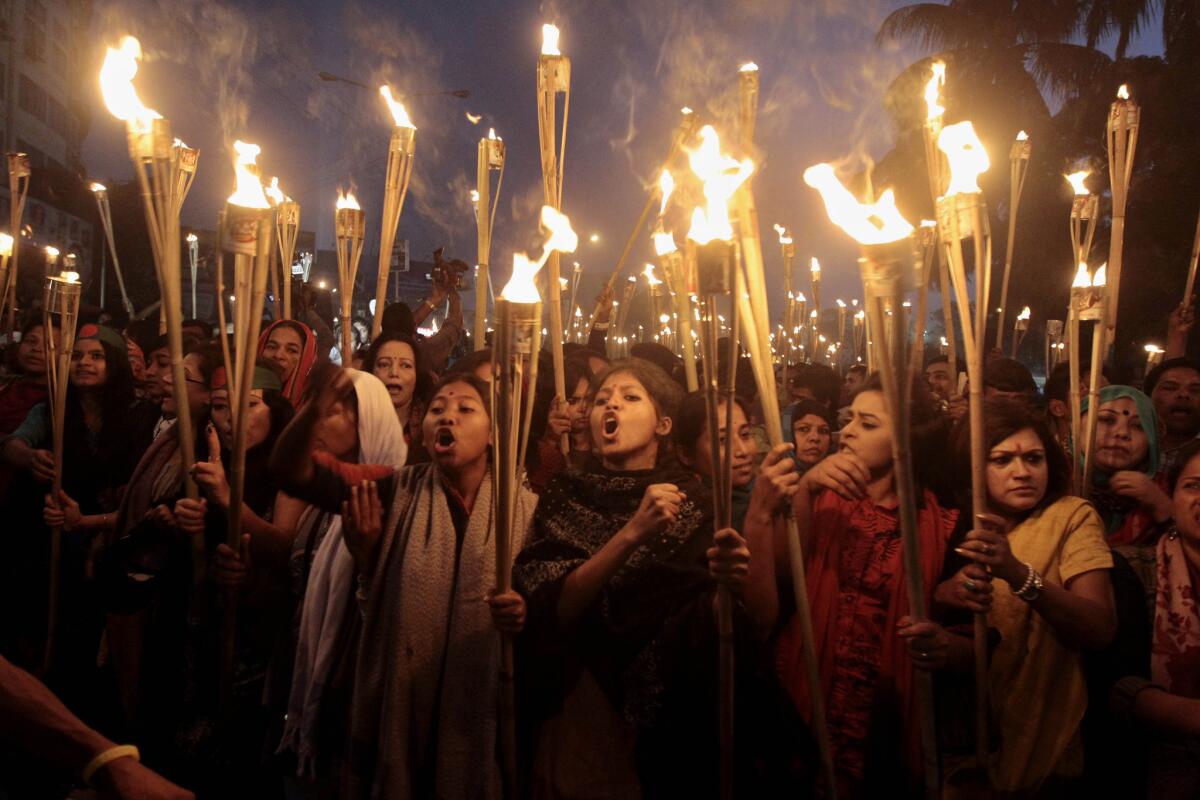Bangladesh opposition leader hanged for war crimes; violence flares

- Share via
Bangladesh executed a leading Muslim opposition figure late Thursday who had been convicted by a government-constituted war crimes tribunal of offenses allegedly committed during the country’s 1971 war for independence from Pakistan.
The hanging of Abdul Quader Mollah in a Dhaka jail at 10:01 p.m. was announced to national media by chief government administrator Sheik Yousuf Harun.
Mollah’s execution followed by less than a day a decision by the Bangladesh Supreme Court to reject his appeal of the death sentence imposed just three months ago. The government-aligned Daily Star proclaimed on its website “Butcher of Mirpur Hanged,” and offered a graphic account of brutal slayings he was said to have committed.
The newspaper also reported that former President Hussain Mohammed Ershad, who ruled during and after the martial law regime that followed a 1982 bloodless military coup, had been detained along with Ruhul Amin Howlade, head of Ershad’s Jatiya Party.
U.S. Secretary of State John F. Kerry had called Bangladesh Prime Minister Sheik Hasina Wajed late Wednesday from Washington and urged her to cancel or at least delay the execution, a source familiar with the U.S. diplomat’s intervention said on condition he not be identified. Kerry reportedly argued that Mollah’s trial didn’t meet international standards for fairness and justice.
Foreign and domestic media reported government supporters were celebrating in the streets of Dhaka.
Sources in contact with Mollah’s supporters in the Jamaat-e-Islami party said opposition street demonstrations also gathered force late Thursday and raged through the early hours of Friday.
“It already started last night and will continue to grow,” James Mulvaney, a former journalist in Southeast Asia now involved in human rights investigations, said of the unrest swelling in Bangladesh. “It is a relatively unruly country that degrades into violence at the drop of a hat or a penny rise in the price of bread.”
Jamaat-e-Islami, which opposed the 1971 separation from Pakistan, and the main opposition Bangladesh Nationalist Party had warned that the execution of Mollah would fuel political violence that has been mounting ahead of a Jan. 5 general election. Opposition forces have been agitating for an independent caretaker government to conduct the election in a country where voting irregularities have been alleged in recent polls.
Hasina and her chief rival for power, Bangladesh Nationalist Party chairwoman Khaleda Zia, have traded accusations of corruption and voting fraud for the more than 20 years that they have vied for government leadership.
Opposition politicians accuse Hasina of creating the war crimes tribunal to target political opponents. Mollah is the first to be executed since Hasina’s government began issuing indictments against dozens of war crimes suspects in 2010, many of them opposition figures.
Toby Cadman, a British lawyer who has defended other Bangladesh politicians brought before the suspect tribunal, said the hanging of Mollah and arrests of other opposition figures were likely to instigate massive unrest and prompt Hasina to declare a state of emergency.
United Nations emissaries had been in Dhaka attempting to negotiate an election oversight plan that would avert further political conflict and had urged Hasina against letting the execution go forward, Cadman said.
“If there were a free and fair election now, the opposition would win and probably by a large margin,” he noted. “If she were to agree to the U.N. deal that was in the works, she loses her power. If she creates sufficient instability, that allows her to declare a state of emergency and postpone elections indefinitely so she can cling to power.”
Cadman, who was arrested and expelled from Bangladesh two years ago for criticizing government interference with the tribunal, said the war crimes court was “completely politically manipulated.” Although there are undoubtedly many Bangladeshis who wanted to see those who committed atrocities in the war 42 years ago brought to justice, Cadman said, the tribunal has evolved as a means of eliminating Hasina’s opponents.
Mollah was convicted by the tribunal in February of killing a student and a family of 11 and of helping Pakistani troops kill 369 others during the independence war, the Associated Press reported from Dhaka. He was initially sentenced to life in prison, but the Supreme Court in September changed the sentence to death.
Despite a booming textile industry, Bangladesh remains one of the poorest countries in the world, ranked 192nd in per capita gross domestic product by the CIA World Factbook.
Twitter: @cjwilliamslat
More to Read
Sign up for Essential California
The most important California stories and recommendations in your inbox every morning.
You may occasionally receive promotional content from the Los Angeles Times.











